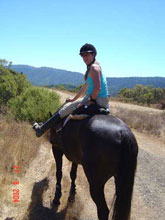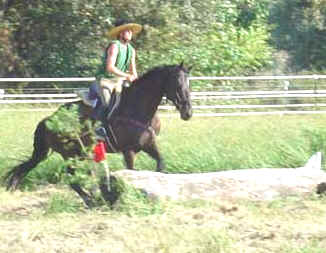 Cross Country Riding on $10.00 a day
Cross Country Riding on $10.00 a day
I only had a three hour drive home from the United States Eventing Association (USEA) Instructor Certification Program (ICP) workshop Thanksgiving weekend. I know the exact location on the road where I thought, "savor". I wanted to savor the experience. I didn't know whether to talk about it on the cell phone in a call home, or whether to just quietly think. I thought of my favorite vanilla ice cream with the dark chocolate covered almonds, and the little lines on the mounded white spoon after I would purse my lips while slowly pulling the freezing delight from between my tongue and upper lip. I thought of gravy on mashed potatoes, iridescently glistening in a dazzling contrast, dripping atop the mooshy opaque creamy mound. I thought about reduction sauce....
Why food? Was I hungry? I had just finished the most satisfying equestrian experience of my life. I wanted to keep every detail poignant in my perception. I wanted to slowly absorb everything I was told. I wanted to chew on everything that was said to me. I wanted to taste becoming that better rider. I wanted to swallow the questions, "How good am I", "Why did I come", "What are my goals" "Do I fit in". I wanted to drool over and digest these questions and become that better human that is supposed to evolve from self exploration.
I really cannot separate my experiences and perceptions about a particular incident from the encompassing experiences I have lived and the perceptions of who I am. Who am I, that is going to tell you my perceived experience about the USEA ICP?
The "IC" Program and "I"
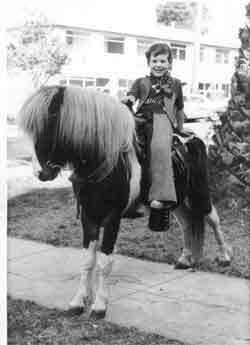 I have been a follower of John Lyons, Dr. Deb Bennett, Clinton Anderson, Dr. Sue McDonnell, and Robert Miller, DVM. I have read Sally Swift, Podhaijsky, Klimke, Franz Maringer, Jane Wallace, Jimmy Wofford, and Stephen Budiansky to name just a few.
I have been a follower of John Lyons, Dr. Deb Bennett, Clinton Anderson, Dr. Sue McDonnell, and Robert Miller, DVM. I have read Sally Swift, Podhaijsky, Klimke, Franz Maringer, Jane Wallace, Jimmy Wofford, and Stephen Budiansky to name just a few.
No matter, I am still that same young girl, who somewhere inside questions her entitlement, her skill, her perceptions and longs to be praised, validated, agreed with and sided with when the bets are laid on the table.
It is only logical that I would want to be certified, to be recognized against a measurable standard in my chosen occupation and avocation so everyone would know me as "A-Ok", "Knows about horses" (KAH), "Has a good eye" (HAGE), "Can spot a lame horse" (CSALH) or "Won't Get You Killed" (WGYK).
I first became aware of the developing USEA IC program in 2000. I attended the USCTA (now the USEA) Instructors' Education/Certification Program in October 18, 2000 at CTETA (now the Horsepark.org) in Woodside. It was taught by Captain Mark Phillips. I purchased the ICP workbook as soon as it was available in 2002, and it has been on my bookshelf since that time.
When the workbook came I remember questioning myself about who would be my mentors, because the program endorses and relies upon professional mentorship. Not that I did not have mentors, but because my approach to equestrian training is eclectic. I have been an equestrian since I was two years old, and a riding equestrian since I was seven, and a working student since I was 11, and began formally instructing and training when I was in my 40's. I have and have had many mentors, from many disciplines.
In my early years, being a little girl whose parents did not have nor could afford much, I ingratiated myself upon the owners of the former Circle M Ranch in the Almaden Valley in San Jose, Ca. I was so effective at helping around the ranch, at saddling, at grooming, at riding barn sour rental string horses, at baby sitting children, at mucking paddocks, at leading dude-string rides, and at fixing fences that my "other mother" adopted me as her "part-time" daughter. She is my greatest equestrian mentor, Jeanie, the owner of Triple J Ranch in Brentwood, Ca. A working equestrian facility owner, with the kindest heart who cared enough to reward me with opportunities that I would not have otherwise been afforded.
For an eventing mentor, I thought about one local trainer with whom I had had a few lessons and a disagreement we had over training methods. No, I couldn't use her as a mentor. I didn't know what eventing mentor I would use? The IC program was new, I did not know who-was-who in the local event scene. I guess I just forgot about the USEA certification program for awhile.
I had already certified in 1994 through both the American Riding Instructors' Certification Program (ARICP) and Certified Horsemanship Association (CHA, formerly Camp Horsemanship Association, formerly Association of Horse Safety Education AHSE, formerly associated with AAHS American Association of Horse Safety AAHS) and have been a continuing member of American Horse Safety Association (AHSA) and followed the American Medical Equestrian Association (AMEA) since that time as well. I participate in clinics and schooling competitions, and am an avid reader about most things equestrian.
For my personal pleasure, I like low level eventing and riding cross country because it is fun and it is an objective competition. Except the dressage, what could be a less subjective measures than optimum time, meters-per-minute and going clear? Dressage, the necessary evil, is at least historical in its subjective evaluation. I don't need a lot of silver ornaments on my saddle, my horse doesn't need to know which fruit or nut to roll on the ground or how high he should lift his feet or how long to grow his mane. I can live with the dressage. I can even like the obsessive compulsive dissorder (OCD) qualities that it offers.
Since eventing is what I like to do, I introduce many of my clients to it. It is one of the training schooling activities that we do each year. To prepare for schooling shows or for the eclectic type of training that I do, there isn't a certification. But, to teach the thing I like the most, now there is a certification. I should be working toward it, I should be a candidate.
The ICP Workshop
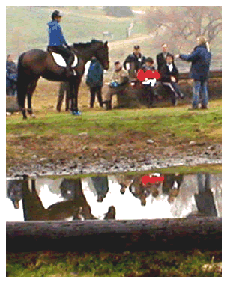 Before candidates can be assessed and recognized for their USEA Level of teaching, they must attend an ICP workshop. The workshop is based on teaching, training and professional mentoring in the disciplines of Dressage and Jumping--both stadium and cross country.
Before candidates can be assessed and recognized for their USEA Level of teaching, they must attend an ICP workshop. The workshop is based on teaching, training and professional mentoring in the disciplines of Dressage and Jumping--both stadium and cross country.
Candidates observe, listen to, practice teaching before and even argue with recognized professionals in the world of eventing who are designated as USEA faculty and mentors for the sport. Faculty follow the USEA Standards set by a committee whose members are World Class equestrian competitors and educators. There are defined teaching levels, theories and a glossary of terms to which the faculty adhere, and it is all organized and outlined in the workbook.
To purchase a copy of the Workbook or to register for the ICP program, one should contact:
Nancy Myers
Educational Programs Manager, USEA
525 Old Waterford Road NW
Leesburg VA 20176.
Tel: 703-779-0440 Ext 3007, Fax: 703-779-0550,
E-mail: nancy@useventing.com
I heard about the Nov/Dec `04 ICP workshop in a mailing from Connie Arthur's Lone Tree Farm /Vista del Rio. Vista del Rio is a wonderful 100 acre eventing facility that simmers in the river bed along the Touleme River. Water is plentiful, making the cross country course like a spinach salad topped with jumps. Even in the heat of summer, because the course is irrigated, the temperature on it is crisper and cooler even when the day is boiling. The footing is sandy river bed. I was familiar with Vista del Rio from it's schooling events and paces.
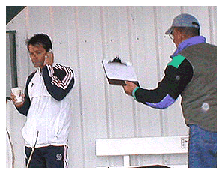 The workshop cost for an ICP candidate was about $700 for six days. Taken as an academic investment, it really was quite reasonable. Auditors paid about $300. Lunch and breakfast was included. Riders paid $10.00 a day. What? That couldn't be right? I could ride, have lessons and be observed by faculty such as Don Sachey, Brian Sabo, Darren Chiachia AND have lunch included? This was a real training smorgasborg.
The workshop cost for an ICP candidate was about $700 for six days. Taken as an academic investment, it really was quite reasonable. Auditors paid about $300. Lunch and breakfast was included. Riders paid $10.00 a day. What? That couldn't be right? I could ride, have lessons and be observed by faculty such as Don Sachey, Brian Sabo, Darren Chiachia AND have lunch included? This was a real training smorgasborg.
I felt insecure about teaching and training in front of people who I didn't know and who I was sure would find me like a little country bumpkin, like a glazed donut or an average boiled potato. Too scary. Having lessons in front of them felt ok. So, I signed up to be a rider. This felt like the best was to start working toward my candidacy.
When I sent in my registration, there was a need for jumping riders and I jumped at it! There wasn't a need for dressage riders, so I audited the dressage component.
The Dressage Workshop
There were about 12 candidate instructors. They were preparing for Level I and Level II assessment. Level I is based on Novice level eventing and Level II on Preliminary eventing.
Novice level dressage is similar to a USDF training level, very basic, correct, straight, balanced, throughness. Did I mention "safe"? Form the onset, participants were told if there was a hole in their safety methodology, their skill would not matter; they would fail the assessment if there was a breech in safety.
I had never met Don Sachey or Brian Sabo, I had only heard about them. They were faculty for the dressage clinic. Both were very personable, professional, supportive, direct and honest. It was so refreshing to hear constructive criticism that empowered the recipient to rise to the occasion instead of just flattening them like a pancake.
The workshop format was lecture and demonstration lessons given by Don and Brian, and then candidate demonstration lessons critiqued by Don and Brian. Each candidate had 30 minutes to perform a safety check, assess horse and rider, tell the rider what the lesson would teach, teach the lesson and then conclude the lesson with a review and homework assignment for the rider.
I was able to watch a variety of recipes for the same entree. The ingredients came from the lesson format in the workbook and from what the candidate, rider and horse poured into the arena. Some of the candidates were humble world class riders, who had clear experience far beyond Preliminary eventing. Some were less humble with more modest experience. Every candidate was treated the same. The proof was in the pudding. Remember, the rider is just an innocent benefactor for the candidates to practice on and demonstrate their knowledge and teaching skills. One rider mentioned to me, "It's weird, it is sort of like being third party to your own lesson".
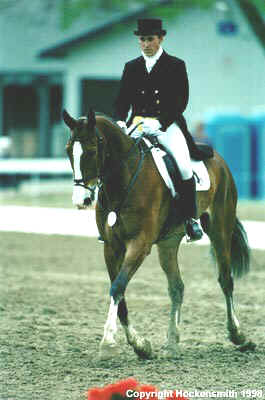 It did not seem to matter what the level of the rider was, there were candidates who dramatically improvedx their tutelage and there were candidates who were more challenged to effect a noticeable difference in horse and rider.
It did not seem to matter what the level of the rider was, there were candidates who dramatically improvedx their tutelage and there were candidates who were more challenged to effect a noticeable difference in horse and rider.
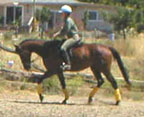
For example, there were a number of dressage riders who had the common practice of having their horsesx behind the bit. The horse's neck was nice and round, but the poll would be below the top vertebrae of the neck. Though the rider would resist the unfamiliar, feeling as if the horse was "strung-out" when not behind the vertical, more experienced candidates were able to convince and guide the riders to let the neck soften just that extra bit, and to let the horse come through that extra bit, and voile' Creme de creme, a horse in a beautiful forward flowing movement, with it's head just so subtly vertical and the poll at the highest point in the frame.
There were some event riders who competed on inter-collegiate teams or who where schooling third level dressage. The less experienced candidates when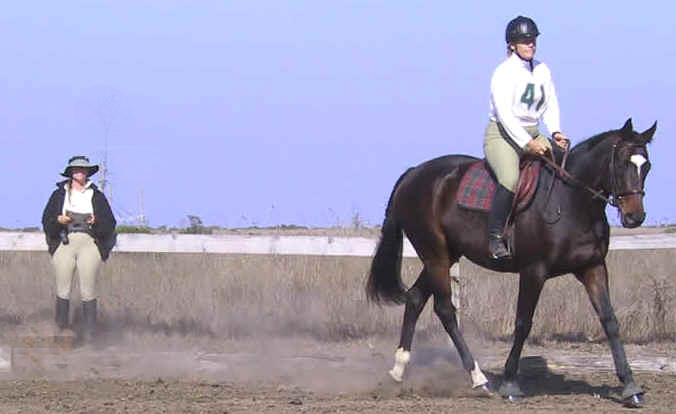 graced with such a knowledgeable combination sometimes effected a less a dramatic end result. It was common for some candidates to focus on a minute detail of foundation, such as rhythm. Instead of taking lack of rhythm as one element of the overall goal. The overall goal would be to demonstrate as much knowledge as possible in as short a time as possible. If the lesson focused only on rhythm, the faculty could not assume that the candidate knew more than what they taught. In those instances, it was suggested that candidates make a clear explanation of rhythm, and how it would ultimately affect outcome, but also address throughness, looseness and balance-- the key elements outlined in the workbook that comprised an eventing horse and rider dressage team.
graced with such a knowledgeable combination sometimes effected a less a dramatic end result. It was common for some candidates to focus on a minute detail of foundation, such as rhythm. Instead of taking lack of rhythm as one element of the overall goal. The overall goal would be to demonstrate as much knowledge as possible in as short a time as possible. If the lesson focused only on rhythm, the faculty could not assume that the candidate knew more than what they taught. In those instances, it was suggested that candidates make a clear explanation of rhythm, and how it would ultimately affect outcome, but also address throughness, looseness and balance-- the key elements outlined in the workbook that comprised an eventing horse and rider dressage team.
Being an auditor, I had the benefit of switching between the teaching groups and seeing different candidates teach the same horse and rider combination. It was like an all-you-can-eat buffett of trainers, riders and horses.
Both Brian and Don gave very honest feedback to candidates. They both expressed that, although they might teach differently, the criteria would be: did a candidate effect improvement in the horse/rider combination as defined by the criteria in the ICP workbook. Don said, often he would feel as though he wanted to comment during a candidate's assessment, but doing so did not allow a candidate the opportunity to address the issues themselves. Don also said, that many times he learned that when he was quiet, the candidates often would come to a similar conclusion that he was thinking or would even express a novel issue.
I left the three day dressage workshop being incredible motivated. I had compared my self to every candidate, I had put my seat in the place of every rider, I had taken in every morsel of guidance. I could barely wait to get home and put my horses into my hands and to start picking at just some of the issues I knew I needed to work on.
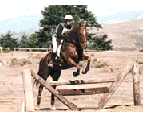
The Jumping Workshop
For the jumping clinic, I would be a demo-rider, not an auditor. This made me anxious, especially after seeing the quality of riders in the dressage workshop. It is difficult to watch beauty and talent without looking at one's self. I have confidence about my abilities, but I can have a lack of correctness and follow-through. I know myself.
My Pickle is not a high-dollar horse, and even if he were, it is far too late to matter. He is my pet and I have benign love for him--attachment. I enjoy letting him enjoy a natural a life as he seems to like. That is another way of saying, he is dusty, his hair is long, his mane isn't pulled, his legs and whiskers aren't shaved, he has crusts of mud from a good rolling-over and he so loves his pasture mates he makes a ruckus when separated. We both needed to focus on our presentation for this workshop. It was scary to me.
I would be a Training level rider. After auditing the dressage workshop, I rode almost every day and worked on refining my dressage. Pickle suffered the indignation of a good vacuuming and clipping. He was so obedient after two solid weeks of work, I wondered if I wouldn't have enough good horse, instead of too much naughti horse.
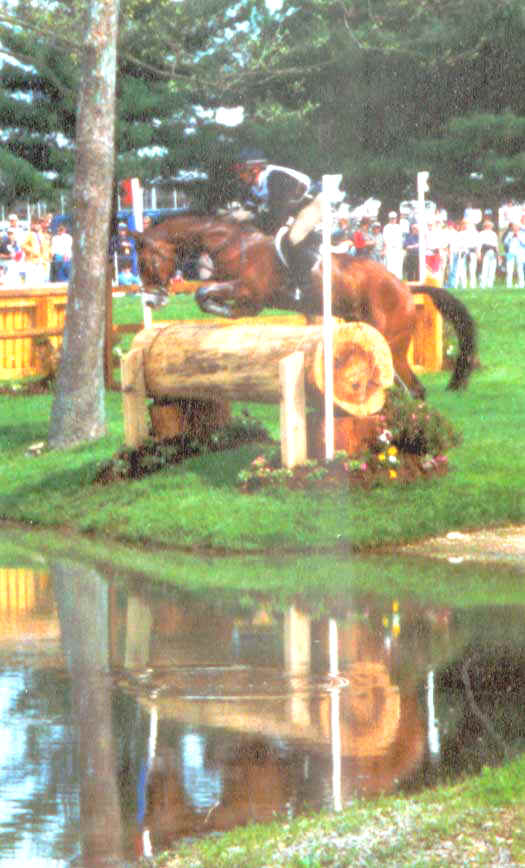 It really didn't matter that the workshop was not about the riders or for the riders. When you are amidst greatness, one can not help but fear scrutiny. Don Sachey, was an Olympic Team Gold Medalist. I had always thought such talent might be lofty, maybe a little disdainful toward such common place goals as mine. But, I could myself one morning chatting in the kitchen over a cup of coffee with Don, while still wearing my fuzzy robe, commiserating about property values and the aches, pains and questions of health that come with getting older.
It really didn't matter that the workshop was not about the riders or for the riders. When you are amidst greatness, one can not help but fear scrutiny. Don Sachey, was an Olympic Team Gold Medalist. I had always thought such talent might be lofty, maybe a little disdainful toward such common place goals as mine. But, I could myself one morning chatting in the kitchen over a cup of coffee with Don, while still wearing my fuzzy robe, commiserating about property values and the aches, pains and questions of health that come with getting older.
The faculty for the jumping workshop was Darren Chiachia and Don Sachey. I had a good feeling about Don after the dressage workshop. But, what would Darren be like, a two time Olympian and a World Cup Gold Medalist?
During the jumping clinic, more of a social camaraderie developed for me. I talked more with other riders, candidates and auditors. Every evening, groups of us went to eat and talked about the day. I learned more about several of the candidates and about Don and Darren.
One Candidate manages the 120 horse equestrian program at the University of Davis. She was the test rider for the Olympic Cross Country course in Mexico City. She was the first horse and rider to jump that Olympic course to test its design. Several of the candidates had ridden at four star events in England, and at Rolex here in the US. Many had ridden all over our country and with top eventing trainers such as Jimmy Wofford.
Some candidates came from different walks of life. One candidate was a practicing psychotherapist and lecturer. One was a school teacher. And, several candidates were like myself, of humble beginnings, from small facilities having varied experiences seeking a rite of passage toward standard, certified equestrian training.
I had three jumping lessons during the workshop. The first lesson the candidate focused on smaller details. Pickle was fairly bored and very well behaved. I would have liked to have been challenged more, jumped more, and jumped higher. To my credit, the faculty said the same. Given the ability of horse and rider, the candidate had a greater opportunity to demonstrate more of her ability and instead chose to focus on trot and canter poles when she was being assessed as a Preliminary level instructor. And, not to my credit, both candidate and faculty noted that I needed to follow through more, that before the end of the exercise I would loose my focus. I need to ride actively and focused beginning to end. Yes, it's true, it is part of my childs-play, goofing-off having "pony fun".
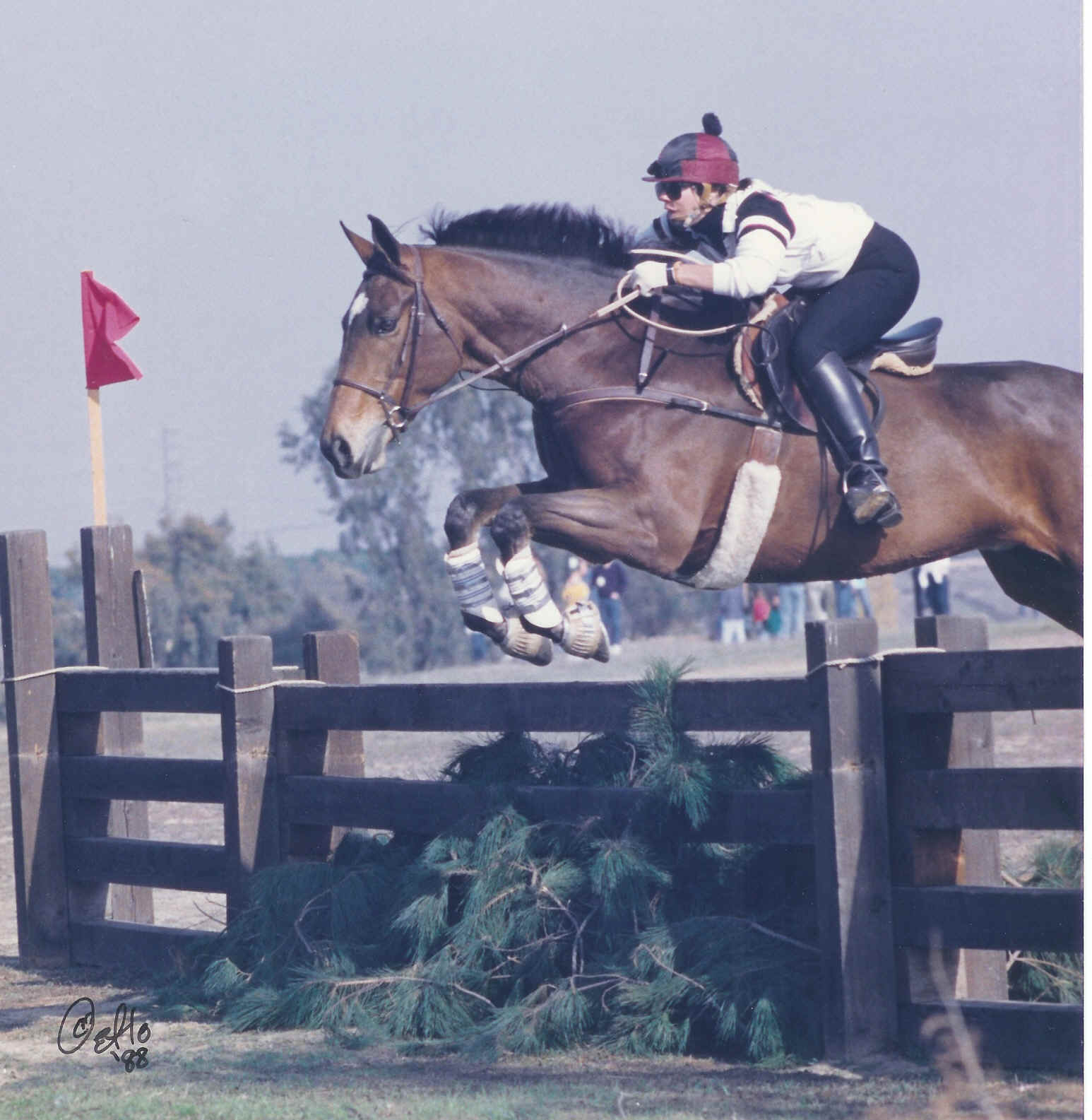 My second lesson was cross country. Darren wanted candidates to focus on gallop position. Pickle was a monster, wanted to run at and after every fence. I would have liked the candidate to work to mellow Pickle, to work on his adjustablility. Instead, she focused on what I thought was sending him forward. He was already too forward. The faculty person didn't say much in my presence, he just asked how it was for me. Later when the candidate and I talked, we both felt as if we didn't do well. We both were suffering under the pressure to perform. She was also assessing for Level II.
My second lesson was cross country. Darren wanted candidates to focus on gallop position. Pickle was a monster, wanted to run at and after every fence. I would have liked the candidate to work to mellow Pickle, to work on his adjustablility. Instead, she focused on what I thought was sending him forward. He was already too forward. The faculty person didn't say much in my presence, he just asked how it was for me. Later when the candidate and I talked, we both felt as if we didn't do well. We both were suffering under the pressure to perform. She was also assessing for Level II.
My third lesson was jumping ditches. After the communication confusion in my second lesson, I really wanted this lesson to be good. Pickle was well behaved and attentive. The candidate and I were alone as we walked to the ditches. I told him, "If you want to have a good lesson, don't send this horse off galloping, first work on adjusting his speed, letting him go and bringing him back. Then you will have something to work with". It was a great lesson. Faculty even stepped in at the end, and I got a 5 minute private from Darren Chiachia. He had a great assignment for me. Get video taped and see for myself that sometimes I am sending Pickle forward when I don't intend to be.
One thing that continues to stand out in my mind are the stories of injuries --broken legs, broken backs, broken hips, broken hands, broken collar bones, injured internal organs, concussions. I am fortunate in all my years to have luckily and carefully escaped serious injury. The greater the history, the greater the injuries. Darren told a story of having a horse fall over on him six months before he won the Gold Medal at the World Cup. He said the most painful day was the day after the Gold Cup, when he could actually "take the time" to feel his injuries.
As I return to my daily routine, to my small training facility (STF), to my rider induced horse inconsistencies (RIHI), and my hungry horses wanting hay (HHWH), try as I might to keep ever present those delectable days, they slowly dissolve, blending into the present. All that is left is the taste of knowing greatness. My just desserts is that a single, outstanding experience becomes a slice of the pie of my total equestrian training experiences. Riding Cross Country on $10.00 a day, a seemingly budget lunch, was a priceless gourmet feast. 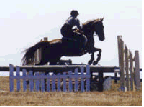
amber@equestriantraining.com
Use the "Back" button on your browser to return to the homepage 